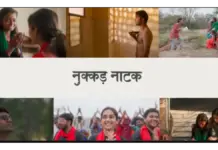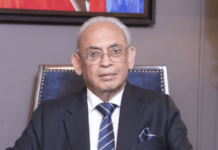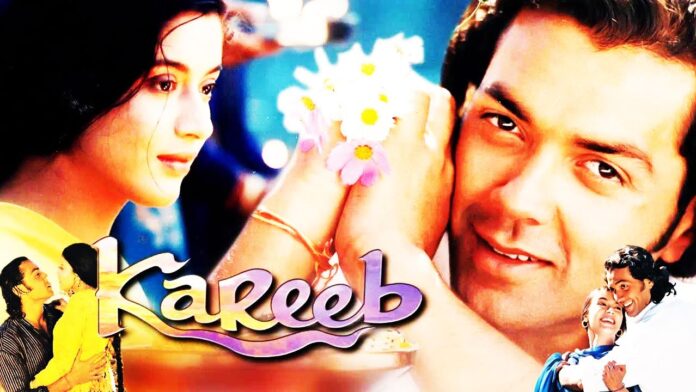KAREEB
Vinod Chopra Productions’ Kareeb is a love story set in a small town of Northern India. A poor girl and a rich boy fall in love with each other but the boy’s father will not let his son get married to a girl who doesn’t bring dowry. The boy, in order to fool his father, robs his money and gives it to him as if it were the dowry sent by the girl’s maternal uncle. All hell breaks loose when the theft comes to the notice of the father right on the day of the wedding. The marriage is stalled, which gives a heart attack to the girl’s widowed mother. She is shifted to a city hospital but the boy can’t do much because his enraged beloved has asked him to keep away. The boy, nevertheless, goes to the city and keeps tab on the mother’s progress. Finally, when over a lakh of rupees are required for the mother’s heart surgery, the boy comes to the rescue of the poor girl, but again, by unfair means. This not only wins him back his beloved but also prevents her marriage to the doctor attending to her mother.
While the first half has very interesting light moments between the boy and the girl, there is absolutely no romance in the post-interval portion. Not only that, the pace is very slow in the second half, and the drama seems to almost not move. One reason for this is that almost the entire second half has been shot in the hospital and the laundry which is opposite the hospital and in which the hero camps. Further, there’s no heroism of the hero in the whole film. Merely because the heroine has sworn him to keep away, his not coming to her aid in the hospital does not appeal. What’s more, there arises a feeling that he isn’t even trying hard enough to collect money for the mother’s treatment until towards the end. It is for this reason that the emotions simply do not come across because one doesn’t feel sorry for a hero who is not doing his best. The hero being conned by a couple also fails to have the emotional impact, if only because it is not the hero’s hard-earned money that’s lost. Even in the climax, the hero resorts to stealing, and his family members and friends also lie about his winning the lottery, further downgrading the character of the hero.
As against the abovesaid weak points in the story and screenplay, what is appealing is the comedy. While some scenes are hilarious, there are a few which bring a smile to the lips. But the fact remains, the drama after interval is weak. Also, the comedy is more of the kind that will be appreciated by the gentry and city audience. Climax is ordinary.
Bobby Deol does well in the light scenes but is not really good enough in the dramatic ones. His long hair rob him of Indian looks. Neha makes a confident debut and endears herself to the audience with a cute performance. She, however, needs to improve a lot in dancing, the awkwardness showing in the solitary and small dance piece she does in a song. Saurabh Shukla and Manav Kaushik are fantastic and evoke laughter at several places. In fact, they are the best performers in the film. Amit Phalke also impresses with a performance that’s natural to the core. Moushumi Chatterjee does an able job. Johny Lever’s comedy is enjoyable. Abhay Chopra gives a restrained performance but his dialogue delivery is not only too fast, it is also unclear at places. A star figure would have been a better choice for the role. Shammi Kapoor and Sushma Seth lend formidable support, and the change in the character leaves the audience quite shocked. The other artistes provide good support.
Director Vinod Chopra’s handling of the subject is sensitive and he also makes the film a visual delight. But his script sense leaves a lot to be desired. Anu Malik’s music score is good. All the songs are very melodious. Song picturisations do not befit a love story; they are too ordinary. Binod Pradhan’s camerawork is remarkable; the exotic locations have been fabulously captured by him. Editing is loose and the film could do with several deletions. Mixing is improper at places. Production values are fair.
On the whole, Kareeb remains a film for cities and the class audience and can be expected to do well in good cinemas of ‘A’ grade centres. For the distributors, therefore, the going will prove tough. Business in Bombay and South may be better.
Released on 17-7-’98 at Liberty and 10 other cinemas of Bombay thru Yashraj Film Distributors. Publicity: excellent. Opening: very good. …….Also released all over. Opening was good in Delhi and Calcutta but average in almost all the other places.
LATEST POSITION
The week that went by was normal.
Dulhe Raja has done very well. In Bihar, it has done exceptional business, breaking several records, and is expected to cross the crore mark there soon. It picked up in C.P. where the opening was below the mark. 1st week Bombay 48,92,947 (83.67%) from 14 cinemas (7 on F.H.); Ahmedabad 8,15,242 from 5 cinemas, Padra 1,78,772, Jamnagar 1,17,244; Pune 7,69,496 from 5 cinemas; Delhi 39,57,727 (74.08%) from 11 cinemas (1 on F.H.); Kanpur 5,60,425 from 2 cinemas, Lucknow 3,23,043, Allahabad 1,95,000, Bareilly 1,85,403 (85.82%); Calcutta 15,26,093 from 12 cinemas; Nagpur 6,37,267 from 5 cinemas, Amravati 1,65,535, Durg 1,23,540, Jalgaon 1,53,808, Yavatmal 1,58,879, Bilaspur 1,78,877 from 2 cinemas; Indore 4,62,291 from 2 cinemas (2 on F.H.), Bhopal 3,93,684 from 2 cinemas; Jaipur 13,30,631 from 4 cinemas; Hyderabad 18,17,765 from 8 cinemas (3 on F.H.).
Satya (tax-exempted in Maharashtra from 12th July) is doing wonderful business in Maharashtra. It is steady in Gujarat, Delhi-U.P., East Punjab and the Eastern Circuit. The Telugu version is fantastic. 2nd week Bombay (TF) 37,03,878 (95.29%) from 7 cinemas (6 on F.H.); Ahmedabad 99,949 (2 unrecd.); Pune (TF) 10,30,344 from 4 cinemas, Solapur (TF) 1,76,320 (100%); Delhi 4,65,355 from 2 cinemas (1 unrecd.); Kanpur 1,19,407 (1st 3,07,661), Lucknow 1,75,026, Allahabad 72,000, Dehradun 79,416; Calcutta 2,02,373; Nagpur (TF) 4,37,576 from 2 cinemas, Jabalpur 53,095, total 96,524, Amravati (TF) 1,62,561, Akola (TF) 85,611, total 1,62,026; Jaipur 1,49,542, Ajmer 65,808 (1st 62,516); Hyderabad 4,39,391.
Major Saab continues to do well in Gujarat, U.P. and Bihar. It has been granted tax-exemption in Maharashtra (from July 15). 3rd week Bombay (TF) 17,09,693 (57.52%) from 8 cinemas (7 on F.H.); Ahmedabad 73,760 from 2 cinemas (2 unrecd.), Vapi 2,03,660, total 8,17,880, Jamnagar 74,014, total 3,48,126; Pune (TF) 3,35,361 from 2 cinemas, Solapur (TF) 93,748; Bijapur 2 weeks’ total 1,63,000; 3rd week Delhi 22,37,619 from 9 cinemas (1 on F.H.); Kanpur 2,23,462 from 2 cinemas, Lucknow 2,23,065, Allahabad 1,14,000, Bareilly 45,743 (23.98%), Hardwar 25,000; 3 weeks’ billing of Delhi-U.P. is over 1.30 crore; Rohtak 15,088; Calcutta 3,48,363 from 3 cinemas; Nagpur (TF) 76,531 from 2 cinemas, Jabalpur 1,23,749, total 5,32,788, Amravati (TF) 66,276, Akola (TF from 15th) 43,559, total 2,44,040, Jalgaon 54,854, Chandrapur 1,58,084, Yavatmal 17,633, Bilaspur 51,281; Indore 1,12,251, Bhopal 72,035; Jaipur 2,28,100 from 2 cinemas, 2nd week Bikaner 1,62,546; 3rd week Hyderabad 3,61,377 from 3 cinemas (2 in noon).
Ghulam 4th week Bombay 29,39,613 (75.33%) from 10 cinemas (8 on F.H.); Ahmedabad 1,40,150 from 2 cinemas; Pune 5,89,806 from 4 cinemas (1 in matinee), Solapur 1,23,202 from 2 cinemas (1 in matinee and 1 in 14 shows); Bijapur 3 weeks’ total 3,20,000; 4th week Delhi 7,53,746 from 3 cinemas; Kanpur 1,31,247 from 2 cinemas, Lucknow 1,21,238, Allahabad 45,000, Dehradun 61,000; 1st week Rohtak 20,077; 4th week Calcutta 1,72,406; Nagpur 72,012 from 2 cinemas, Jabalpur 1,44,723, total 7,58,836, Amravati 1,22,245, total 7,28,741, Akola 72,053, total 4,52,362, Jalgaon (6 days) 84,303, Bilaspur 58,064; Indore 87,218, Bhopal 86,312; Jaipur 1,35,705; Hyderabad 6,10,504 from 3 cinemas (2 in noon).
SHAH RUKH DISCHARGED
Shah Rukh Khan was earlier this week discharged by a court in Ajmer in a case field against him by a group of lawyers for using allegedly derogatory words for lawyers in Ram-Jaane. The defence argued that Shah Rukh, being an actor, speaks and acts according to the script written for him and he should not be held responsible for words spoken while acting.
ENTERTAINMENT TAX IN RAJASTHAN REDUCED
The Rajasthan government has reduced entertainment tax to 50% on nett admission rates of less than Rs. 10. The earlier rate of entertainment tax (100%) continues on tickets, the nett rates of which are over Rs. 10.
‘SATYA’ TAX-FREE IN MAHARASHTRA
Ram Gopal Varma’s Satya has been granted tax exemption in Maharashtra for a period of three months from July 10.
‘MAJOR SAAB’ TAX-FREE IN MAHARASHTRA
ABCL’s Major Saab has been exempted from payment of entertainment tax in Maharashtra for a period of three months from 14th July.
‘PARDES’ GOLDEN JUBILEE
Subhash Ghai’s Pardes is celebrating golden jubilee this week. Produced under the banner of Mukta Arts (Pvt.) Ltd., it stars Shah Rukh Khan, Mahima Chaudhry, Apoorva Agnihotri, Amrish Puri, Alok Nath and others. Music: Nadeem Shravan. Lyrics: Anand Bakshi, Cinematographer: Kabir Lal.
YOU ASKED IT
Why are state governments like those of Uttar Pradesh suddenly becoming sympathetic towards the film industry?
– Thanks to the efforts of the industry leaders as well as star-MPs like Shatrughan Sinha, the state governments are realising the seriousness of the precarious situation in which the film industry finds itself today. Further, the industry status granted by the central government is acting as a good starting point for states to act.
The Govinda-starrer, Achanak, did not take a decent opening whereas the other Govinda-starrer, Dulhe Raja, opened to excellent houses. Why so?
– DULHE RAJA boasted of a hit song, Ankhiyon se goli maare. ACHANAK had no hit number. Thus the difference in initials of the two films.
Has J.P. Dutta started shooting his Aakhri Mughal? Who is Abhishek Bachchan’s heroine in it?
– J.P. Dutta has reportedly decided to make another film, not AAKHRI MUGHAL. One hears, it will star Jackie Shroff and Sunil Shetty, besides Abhishek Bachchan.
DO YOU KNOW?
* Now, cinema tickets can be booked on fax. West Bengal distributor Pritam Jalan has introduced the booking-on-fax system with KAREEB in Calcutta. Perhaps, this is the first time anybody has tried this. The response is said to be tremendous. The film, released in three cinemas of Calcutta, drew all shows full on the opening day.
* Music directors Jatin Lalit seem to have taken it upon themselves to make stars sing. Having tasted great success by making Aamir Khan sing Aati kya Khandala in GHULAM, the duo has now gone ahead and recorded a song in the voice of Sanjay Dutt. The song, Ae Shivani, was recorded for writer-turned-director Sanjay Chhel’s film, KHUBSOORAT.
* Amit Kumar created a record of sorts on 14th July by recording four songs in a single day. A song each was recorded by music director Viju Shah and duo Jatin Lalit for David Dhawan’s BADE MIYAN CHOTE MIYAN and Dharmendra’s as yet untitled film respectively. The remaining two songs were composed by music director Nilu Gavankar for Super Hit Cinema’s untitled film.
* A vinyl 20′ x 20′ hoarding of SATYA is the first of its kind in Malegaon. Displayed by Bombay distributors VIP Enterprises at Sandesh cinema, it is attracting the public in large numbers.
MIX MASALA
SILVER COINS FOR SILVER JUBILEE
The silver jubilee of Gunjan Cinema, Vapi, is being celebrated with the distribution of silver coins. The cinema had opened on 12th July, 1973. Perhaps, after 25 years, the cinema’s golden jubilee will be celebrated with the distribution of gold coins.
3-E
Education-Entertainment-Enlightenment
‘Penalty’ For Over-Spending?
While the Maharashtra government’s decision to allow the unspent service charge to be carried forward for a period of two years is laudable, what one fails to understand is why the government has not permitted exhibitors to carry forward the excess spent in a year (more than the amount of service charge collected in that year) to the next year. For instance, if an exhibitor spends Rs. 10 lakh in a year but collects only Rs. 3 lakh, he is not allowed to carry forward the difference (Rs. 7 lakh) to the next year. He will have to spend the service charge collection of the following year in that year or, now, can carry forward that amount for 2 more years. A typical case of an exhibitor being allowed to make a virtue out of not spending enough in a particular year but being penalised for spending more on the cinema in another year! But that’s how the government ‘thinks’.
Competitor Se..
The music of Mani Ratnam’s Dil Se.. is fast receiving both, critical acclaim as well as public appreciation. Released by Venus last week, the audio cassettes and CDs of the film are already so much in demand that Pravin Shah (of Time Audio) remarked that he had never before seen such a tremendous initial craze for any other film cassette in his showroom! Coming as it does from the boss of a rival music company, this compliment must hold a special meaning for Venus. Perhaps, it is time for whizkid music director, A.R. Rahman, to add a few feathers to his cap.
Distributor’s Confidence And Producer’s Magnanimity
Delhi-U.P. distributor Tolu Bajaj, who was to release Gordhan Tanwani’s Pyaar To Hona Hi Tha in Delhi-U.P. on commission basis, has gone ahead and changed his agreement to that for purchase on MG Royalty. Quite rare, one might say, considering that it wasn’t Tanwani’s intention to sell the film on MG royalty basis. Usually, a distributor, who is given a film on pure commission basis, would only too happily release it since he doesn’t have to take any risk. But Tolu’s confidence in the film prompted him to acquire it on MG. In all fairness to Tanwani, it must be mentioned here that he asked Tolu Bajaj to see the film’s first copy and then decide on whether or not he should pay an MG royalty amount for the film, but Tolu thought, it was more graceful to take a ‘blind’ decision. Incidentally, Gordhan Tanwani, who believes in spending lavishly on publicity, has despatched ten times more than the usual quantum of publicity materials, of his film to his various distributors. But the distributors have been told, they’ll be charged only for the usual or normal amount of publicity materials, the cost of the rest to be borne by the producer himself.
Zee To Produce Films
Zee TV is stepping into film production is a big way. Its first venture will be directed by Anil Sharma and will star Sunny Deol. Nitin Keni is incharge of the administrative side of Zee’s production division, and Shyam Gupta (who has directed a film, besides writing the dialogues for films like Ghatak) will head the creative side. The first venture will go on the sets later during the year.
INFORMATION MEETS
“Previously, songs would invariably come from the story. They were not fitted into a story as it is done today.”
– ANAND BAKSHI
RAJ VAIDYA
How can one best describe Anand Bakshi? Calm, collected and soft-spoken, Anand Bakshi’s persona is reflected in the songs that he writes. “Kya karoon, meri tabiyat hi kuchh romantic hai,” says Bakshi in response to a query about his preference for writing romantic lyrics. Having spent 42 years in the film industry, he remains one of the very few vanguards of the older school of lyricists, still very much in business today. He has been able to adapt his writing style to the changing times and, as a result, he remains a much sought-after song-writer, even now. That the younger generations still love his style of poetry has been comprehensively proved by the tremendous popularity of his songs from two hit films last year, viz. Dil To Pagal Hai and Pardes. From being in the Indian Army to becoming an award-winning lyricist, Anand Bakshi has traversed long distances in his career, delivering one classic song after another over the years. Yet, it is his modesty that prevents him from talking about his achievements. He would rather have his songs speak for himself, as they do — in volumes. In this interview, Bakshi allows us to take a peep into the mind of one of the most prolific song writers of our times.
At the risk of asking an oft-repeated question, how did the transition from Army to writing songs for films take place?
– When I was in the Army, I used to love singing — a passion that has refused to leave me even today. During the Army days, I had earned quite a reputation about my singing abilities. But, somewhere along the line, singing gave birth to poetry in me. I don’t know how this happened. Even today, I cannot say why or how I turned to poetry. Anyway, to cut a long story short, I was fully consumed by the desire to write poetry while still in the Army. As both could not be done side by side, I decided to quit the Army and came to Bombay in ’56. After a brief struggle, I began to get a few song writing assignments through which I was able to prove myself.
What, according to you, is the essential difference between literary poetry and film lyrics?
– The basic difference is that as film lyrics are written primarily for mass-appeal, it is very vital that they have simplicity of thought and language. They must be easy for every film viewer to understand. It is a compulsion each film lyricist faces every time he writes a song. In contrast, a literary poet faces no such compulsion. He writes on an independent level without any qualms about the sensibilities of those who read his poetry. In other words, he writes for himself. A film lyricist, on the other hand, must be able to cater to the lowest common denominator through his songs.
Who has influenced you the most as a poet?
– While I was in the Army, I was deeply influenced by the work of D.N. Madhok who had earned the title of Mahakavi back then. Later, I was also influenced by some great film lyricists of yesteryears, like Shakeel Badayuni, Rajinder Krishen and Shailendra.
You are continuing in the 43rd year of a prolific song-writing career in films. How, in your opinion, has the music in films changed over the years?
– All the songs are dances nowadays. You can rarely see songs where heroes and heroines are not dancing with 50 other people. And what kind of dances do they picturise nowadays? Fifty-sixty dancers, all standing in straight lines, with the hero and heroines in front, and moving their hands and legs about in rhythm! It really takes me back to my Army days when we used to exercise in a similar manner every morning. Anyway, the days when a love song or a romantic song was picturised on just the hero and the heroine alone, seem to be over. This is the reason why that intensity, that passion, which was there in the songs of the olden days, is missing today. The very intensity and passion behind each song lent it an individualistic feel in the days of yore. Today, you will find it hard to differentiate between one song and the other. The individuality, or call it the uniqueness, of the older songs is lost today.
What about the process of creating a song — has it changed, too, over the years?
– Of course, it has. Previously, songs would invariably come from the story. They were not fitted into a story, as it is done today. Since the songs emanated out of various situations within the story, the story-writer was able to put in some germs, which were later developed into full-fledged songs by the lyricist. Nowadays, the lyricists and the music directors are asked to compose songs between them and are told that they would be fitted into the story somehow.
Do you feel, the quality of film lyrics has deteriorated in today’s times?
– It depends on how you look at the issue. I will certainly say that the lyrics of songs nowadays are different from those of the earlier times. I think, the main reason why this has happened is because the changing times have brought about the change in the style of lyric-writing. In my opinion, the lyricists of today are okay. You can’t really expect them to continue writing in the same way as before, simply because they — and more importantly, the younger generation of film viewers — haven’t been exposed to the songs of the earlier films.
What do you think about the recent controversy between lyricist Majrooh Sultanpuri and producer Mukesh Bhatt over the song Aati kya Khandala from GHULAM?
– Since I do not know much about the controversy, I cannot comment on it. But as far as the lyrics of the song go, I personally feel that there is nothing wrong with them and hence I do not feel offended by them.
To change tracks, tell us something about your legendary association with Laxmikant Pyarelal…
– I first got acquainted with Laxmikant Pyarelal when they were still assisting Kalyanji Anandji. I had already become a lyricist by then. We used to talk a lot to each other and later, when Laxmikant Pyarelal became music directors, I became their natural choice to pen their songs. We became a team after a couple of our hit songs in the initial years. As we worked more and more together, we were able to develop a very good rapport among ourselves. Another thing that worked in our favour was that all the three of us were nearly of the same age. But the most important thing that made us survive as a team was the fact that we were able to give hit songs at regular intervals. I say this because in our film industry, nothing succeeds like success. Success makes the teams, and failure breaks them.
In recent times, your association with producer-director Subhash Ghai has resulted in a number of memorable songs. What makes you both so formidable as a team?
– Having written all the songs for all of Subhash Ghai’s films, I can say that I understand the style of his filmmaking very well. Similarly, he understands my style of lyric-writing. So, there is a perfect understanding and tuning between us. We think nearly along the same lines on a lot of things. Moreover, apart from being colleagues at work, we also share a warm personal and family relationship. These and, like I said earlier, our successes together are the main reasons why we have been able to continue together for so many years.
Creative people, especially poets, are considered to be eccentric in one form or another. How does the statement apply to you?
– I don’t know about my eccentricities, but I do have this awful habit of chewing paan since a very long time. The habit has affected my health very badly and my doctors have warned me against continuing it. I have succeeded only to a small extent, in kicking the habit so far. Another habit that I have had, right from the time I made my foray into films, is that I am always punctual. In fact, I developed this habit during my Army days when we had to do everything at the appointed time. Sadly, punctuality is not exactly a virtue for the people in the film industry as nobody gets anywhere on time here. Very often, I find myself arriving at filmi functions before anyone else and end up waiting a long time for the functions to start.
Who are your favourite singers?
– Among my all-time favourites, I must include Rafi and Lata Mangeshkar. I also like Kishore Kumar, Mukesh and Asha Bhosle. Among the current lot, I like the voices of Alka Yagnik and Udit Narayan.
Recently, veteran lyricist Kavi Pradeep was awarded with the Dadasaheb Phalke award — the highest honour in the field of cinema in India. Any reactions?
– I would like to say that I am very happy that the contribution of the film lyricists has been appreciated by the government of India. Earlier, Majrooh Sultanpuri had also received the same honour. Kavi Pradeep has given the country some of the most inspirational songs ever written, and rightfully deserves the award.
What is your opinion on the increasing trend of Hindi pop music. Would you consider to write the lyrics of a pop album, if offered ?
– I can neither condemn pop music nor appreciate it for the simple fact that I cannot understand it. As regards the other question, I have already refused a number of offers of writing lyrics for pop albums.
You have seen a lot in your 42 years in the industry so far — be it fame, fortune or happiness. Is there still something that you have always wanted to do but still haven’t been able to?
– Yes, in fact, there is. As I mentioned earlier, I love singing. It is more than a passion with me. Sadly, I haven’t had much of a chance in this direction so far. It is true that Laxmikant Pyarelal gave me a break as a singer in Mom Ki Gudiya, where I sang a duet with Lata Mangeshkar, but after that, I was able to sing only three or four songs over the years. I hope, some day, I will be offered the song that would do justice to my singing abilities. I want to be remembered at least for one memorable song that I have sung.
Finally, what keeps you going so strong even after completing four decades in the industry?
– My need to work. That is the single most important reason for my consistency in films. I firmly believe that necessity pushes people to give their best in whatever fields they are. Those who have all they want, become lax in their work as they do not care whether they would get work the next day. For me, writing poetry is the only source of income I have. My children are yet not well-settled. So, I need to work in order to run the household. In turn, this need pushes me to give off my best in my songs.
Any poetic words, in parting…?
– Tadbeeron se phir jaayen,
Woh taqdeeren nahin hoti.
Jo taqdeeren na badal dein,
Woh tadbeeren nahin hoti.






























